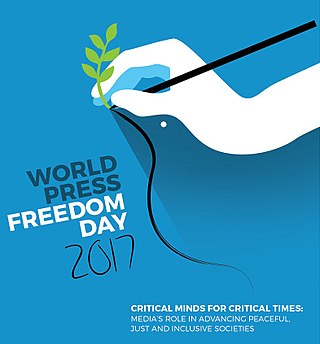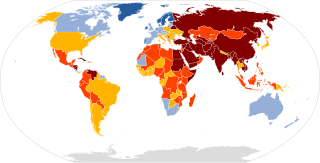The Windhoek Declaration for the Development of a Free, Independent and Pluralistic Press, the Windhoek Declaration for short, is a statement of press freedom principles by African newspaper journalists in 1991. The Declaration was produced at a UNESCO seminar, "Promoting an Independent and Pluralistic African Press," held in Windhoek, the capital of Namibia, from 29 April to 3 May 1991.

The United Nations General Assembly declared May 3 to be World Press Freedom Day or just World Press Day, observed to raise awareness of the importance of freedom of the press and remind governments of their duty to respect and uphold the right to freedom of expression enshrined under Article 19 of the 1948 Universal Declaration of Human Rights and marking the anniversary of the Windhoek Declaration, a statement of free press principles put together by African newspaper journalists in Windhoek in 1991.

IFEX, formerly International Freedom of Expression Exchange, is a global network of more than 119 independent non-governmental organisations that work at a local, national, regional, or international level to defend and promote freedom of expression as a human right.

The International Federation of Journalists (IFJ) is the largest global union federation of journalists' trade unions in the world. It represents more than 600,000 media workers from 187 organisations in 146 countries.
The Tunisia Monitoring Group (IFEX-TMG) is a coalition of 21 free-expression organisations that belong to the International Freedom of Expression Exchange (IFEX), a global network of non-governmental organisations that promotes and defends the right to freedom of expression and freedom of the press.
Human rights in Mexico refers to moral principles or norms that describe certain standards of human behaviour in Mexico, and are regularly protected as legal rights in municipal and international law. The problems include torture, extrajudicial killings and summary executions, police repression, sexual murder, and, more recently, news reporter assassinations.
Human rights in the Philippines are protected by the Constitution of the Philippines, to make sure that people in the Philippines are able to live peacefully and with dignity, safe from the abuse of any individuals or institutions, including the state.
Source protection, sometimes also referred to as source confidentiality or in the U.S. as the reporter's privilege, is a right accorded to journalists under the laws of many countries, as well as under international law. It prohibits authorities, including the courts, from compelling a journalist to reveal the identity of an anonymous source for a story. The right is based on a recognition that without a strong guarantee of anonymity, many would be deterred from coming forward and sharing information of public interests with journalists.

The World Press Freedom Index (WPFI) is an annual ranking of countries compiled and published by Reporters Without Borders (RSF) since 2002 based upon the non-governmental organization's own assessment of the countries' press freedom records in the previous year. It intends to reflect the degree of freedom that journalists, news organizations, and netizens have in each country, and the efforts made by authorities to respect this freedom. Reporters Without Borders is careful to note that the WPFI only deals with press freedom and does not measure the quality of journalism in the countries it assesses, nor does it look at human rights violations in general.

The International Programme for the Development of Communication is a United Nations Educational, Scientific and Cultural Organization (UNESCO) programme aimed at strengthening the development of mass media in developing countries.
Abdost Rind , a reporter in Pakistan, was working for the Daily Eagle, an Urdu-language newspaper in the Turbat area of Balochistan, Pakistan, on 18 February, when he became the second journalist killed in Balochistan in 2011.
Hilal Al-Ahmadi, who was an Iraqi veteran journalist with over 30 years of experience and well known for his reports about corruption, was assassinated in front of his home east of Mosul, Iraq.
The 2012 Veracruz murder of journalists is about the disappearance, murder and dismemberment of three journalists and a woman who worked in public relations whose bodies were discovered in Boca del Río, Veracruz, Mexico. Their bodies were recovered from a canal on World Press Freedom Day, or 3 May 2012, and showed signs of torture and mutilation, which prompted calls for investigations into links with organized crime. The gruesome murder followed other murders of members of the press in the Veracruz area and during the Mexican drug war, and highlighted the danger for working journalists.
Marco Antonio Ávila Garcia, a Mexican crime reporter for Diario Sonora de la Tarde in Ciudad Obregón and El Regional de Sonora newspapers in Sonora state, Mexico. He was abducted in Ciudad Obregón and tortured to death by a drug cartel and left on the side of the road near Empalme, which is also in Sonora. Garcia was the fifth journalist killed in 2012 in Mexico, which has become one of the most dangerous countries for journalists, and his murder preceded the 1 July 2012 Mexican elections, in which drug violence had become a major issue.

José Bladimir Antuna Vázquez García, sometimes referred to only as Bladimir Antuna, was a Mexican crime journalist for El Tiempo de Durango, a newspaper based in Durango, Durango, Mexico. While there was a resolution in the case of Antuna's collaborator Eliseo Barrón Hernández, the murder case of Antuna is still unresolved and reflects the impunity that is widespread among murdered Mexican journalists.

Cristián Alberto López Bello was a crime journalist for the Mexican newspaper El Imparcial and the radio show "Foro Político", in Oaxaca, Mexico. The murder of López was an early case that tested the new powers of federal special prosecutors to investigate crimes against Mexican journalists and freedom of expression. The federal special prosecutor, however, deferred to the Attorney General of Oaxaca, who said three and a half months after the López murder that the motive was a bar fight, announced the arrest of four people, and then resigned the next day. The family publicly disagreed with the official conclusion.
Luis de Jesús Lima was a Guatemalan radio journalist and personality for the Radio Sultana de Oriente in Zacapa, Zacapa Department, Guatemala. He was killed right outside of the station. His death focused the attention given to the safety of Guatemalan journalists.

Safety of journalists is the ability of journalists and media professionals to receive, produce and share information without facing physical or moral threats.

Sustainable Development Goal 16 is one of the 17 Sustainable Development Goals established by the United Nations in 2015, the official wording is: "Promote peaceful and inclusive societies for sustainable development, provide access to justice for all and build effective, accountable and inclusive institutions at all levels". The Goal has 12 targets and 23 indicators.
Justice for Journalists Foundation is a London-based charity whose mission is to fight impunity for attacks against media. Based in London, its main goal is to protect journalists from the abuse of their right to freedom of expression, increase public awareness about attacks on media workers and provide journalists with the knowledge and skills necessary to protect themselves from professional risks.









